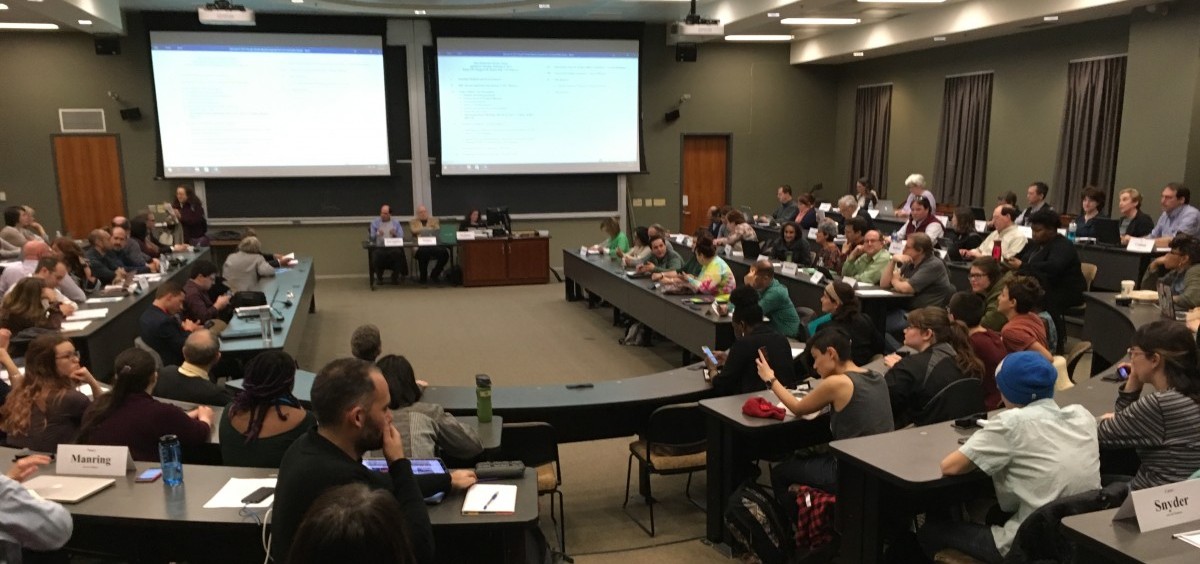News

McDavis Answers To Police Protest Actions, Immigration Policy
By: Susan Tebben
Posted on:
Update: The Ohio University Police Department released a statement from Chief Andrew Powers on Thursday regarding the arrests that occurred at Baker Center on February 1.
“I am writing to clarify some points of confusion and provide important information about protests in general,” the letter read.
Chief Powers detailed the actions taken by OUPD leading up to the arrest of 70 students. While admitting the protests were “peaceful,” he did not agree that they were legal.
“…if a time, place, or manner restriction is violated—as in this case—the assembly is unlawful, regardless of the reason for it,” he wrote.
Read the full statement from Chief Powers here.
________________________________________
During an at-times heated meeting of the Ohio University Faculty Senate, outgoing President Roderick McDavis answered to both faculty and students on two hot-button issues.
McDavis gave a statement and took questions about two issues: what some have called a less-than-adequate response to President Donald Trump’s immigration executive order, and the response of police during a sit-in at Baker University Center last week.
One of the resolutions presented and approved at the Faculty Senate meeting was a resolution in response to the arrests made in a Feb. 1 sit-in at Baker University Center. The resolution asked the university to work with law enforcement to drop the charges against all 70 protesters that were arrested.
Several students were present Monday night, some of whom had appeared in Athens Municipal Court on Monday morning to be arraigned on charged of criminal trespassing.
Those charges were given after some protesters allegedly refused to leave the premises after warnings from police, according to OUPD reports.
But the president said dropping the charges was not his decision.
“Senior administrators at Ohio University do not have the power to drop the charges against the 70 people who were arrested,” McDavis said.
McDavis defended the actions of the OUPD officers and Ohio State Highway Patrol troopers that responded the night of the protest. He said he believed the officers acted within their “duty” when they felt safety of the students and occupants of Baker Center had diminished.
The president also said OU Police Chief Andrew Powers was obligated to maintain an order that he would arrest those that remained in the building after he warned that they would be arrested.
“Once the order (to arrest) was given…that order could not be rescinded,” McDavis said.
He said according to police, five warnings were issued to the protesters, and 40 minutes elapsed from the time of the first warning and when arrests began.
“That’s not a small amount of time,” McDavis said.
When questioned on the idea that Powers could have changed the order and not arrested the protesters, McDavis and OU legal counsel John Biancamano disagreed.
“If you give a warning and you do nothing, what good is the warning?” McDavis said.
Biancamano also answered questions about whether the OUPD was under the control of university administration that night, and why administration was not consulted before arrests were made.
“These are difficult decisions to make,” Biancamano said, adding that the police department does operate “under the guidance of senior leadership.”
Faculty stood with the students at the meeting, expressing their disappointment in an administration they said had not done well enough to keep the situation peaceful and remain accountable.
“The administration can not, one week, organize and march in an MLK commemoration and then abdicate the decision of what to do with the staging of a non-violent protest to the police department,” History faculty member Ziad Abu-Rish said. “That was also a failure in leadership.”
“This is why I’m ashamed to be a professor…at Ohio University right now,” said Bernhard Debatin, a professor of Journalism, citing the “abdication of the role of leadership” he said had caused the incident.
Debatin mentioned a protest that happened in 2014, in which Dean of Students Ryan Lombardi addressed students on the night of the protest, which Debatin said allowed Lombardi to “be an educator and take responsibility.”
“This is not a police job, this is our job, this is your job and your job,” Debatin said, pointing around the room.
Also, on Monday night, McDavis assured students and faculty that protections are in place for international students as the process of Trump’s executive order continues.
While McDavis sent a letter to the university community recently stating that he shares “the increasing concerns from many members of the Ohio University community who are reaching out to me” about the executive order.
“We are taking action, the same action we have always taken,” McDavis said. “Student information has been and continues to be protected…”
McDavis stopped short of officially naming the campus a “sanctuary campus,” as many in the room wanted, saying he wanted to avoid compromising federal dollars that go to student financial aid and other federal assistance.
The executive order was released by President Donald Trump on Jan. 27 and enacts a 90-day ban on the entry of visitors from the following countries: Iran, Iraq, Libya, Somalia, Sudan, Syria, and Yemen. Those who hold valid U.S. visas are also affected.
The senate also approved a resolution opposing the immigration order during Monday’s meeting.
Both resolutions now go to Executive Vice Provost Pam Benoit for approval. If she denies a resolution, she must give reasoning for the denial, Faculty Senate Chair Joe McLaughlin told the senate.

